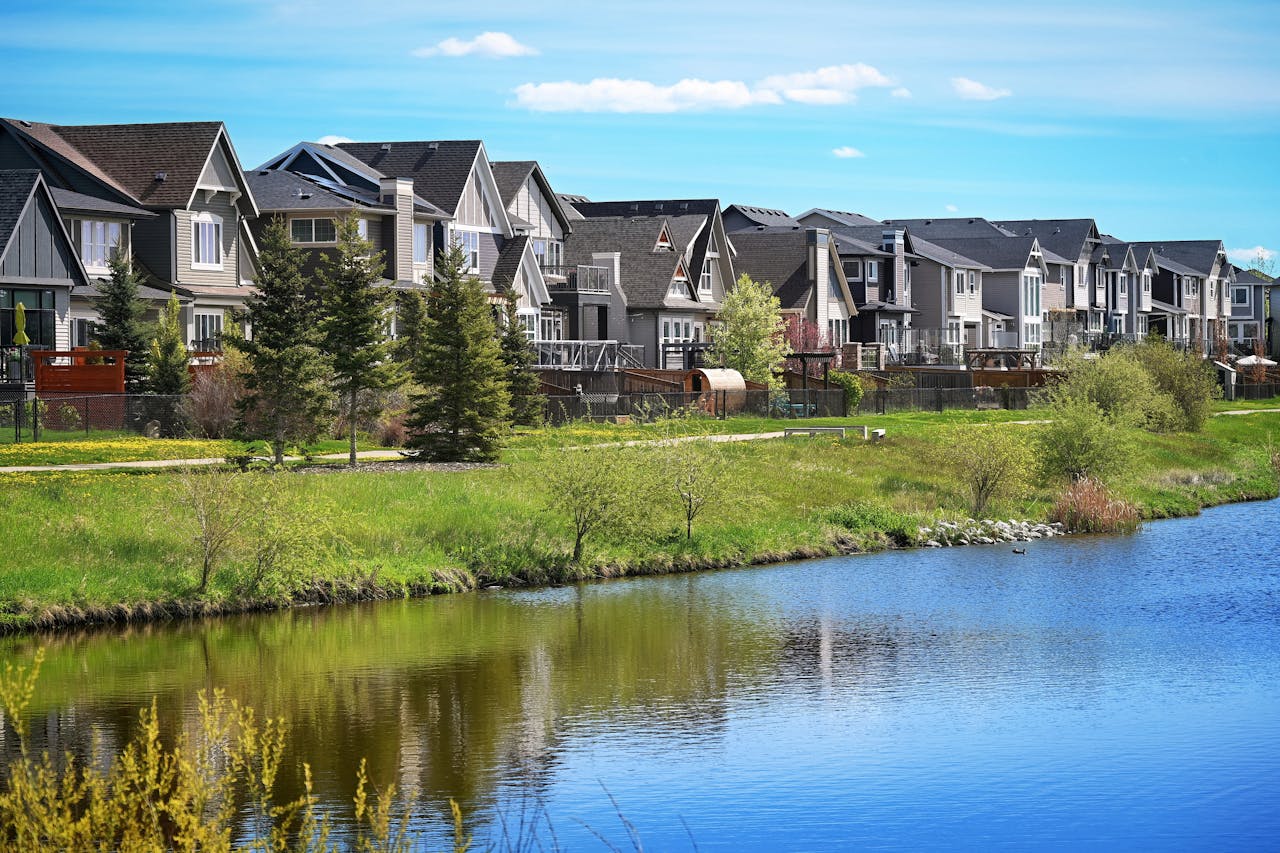Are you dreaming of owning a home in Calgary? The journey to homeownership is exciting, but it requires careful financial planning and preparation. In this guide, we’ll explore the essential steps to help you prepare financially for homeownership in Calgary’s dynamic real estate market.
What This Guide Covers
In the following sections, we’ll delve into:
- Strategies for saving and budgeting
- Understanding Calgary’s unique real estate market
- Navigating mortgage options and pre-approval processes
- Exploring first-time homebuyer programs in Calgary
- Assessing additional costs of homeownership
- Working with real estate professionals
So whether you’re eyeing a downtown Calgary condo or a suburban family home, this guide will provide you with the knowledge and key tips you need to make informed decisions on your path to homeownership.
Let’s begin your journey to becoming a well-prepared homeowner in Calgary!
Understanding Calgary's Housing Market
Calgary’s real estate landscape is as diverse as the city itself. From bustling downtown condos to spacious suburban homes, the market offers options for every type of homebuyer. Let’s dive into the current state of Calgary’s housing market to help you make informed decisions.
Current Market Trends
The Calgary housing market has shown resilience and growth in recent years. Here are some key trends to keep in mind:
- Steady appreciation: Property values in many Calgary neighborhoods have been on an upward trajectory.
- Increased demand: Low interest rates and changing work patterns have fueled interest in homeownership.
- Inventory fluctuations: The balance between supply and demand varies by neighborhood and property type.
Calgary Housing Market Insights 2024
- Calgary housing market trends show a significant increase in home prices driven by limited supply, with the benchmark home price rising 8.5% year-over-year to $608,000, while the number of home sales has decreased by 13% compared to last year.
- The average home price in Calgary has also increased by 13% to $623,245, reflecting a strong demand despite rising mortgage rates and declining affordability in the market.
Factors Influencing Calgary’s Real Estate Market
Several key factors contribute to the dynamics of Calgary’s housing market:
- Economic conditions: The health of Alberta’s oil and gas industry often impacts the real estate market.
- Population growth: Calgary continues to attract newcomers, driving housing demand.
- Interest rates: Changes in mortgage rates can significantly affect affordability and market activity.
- Government policies: Federal and provincial housing initiatives can influence buying patterns.
Best Time to Buy a House in Calgary
While personal circumstances should guide your decision, certain seasons can offer advantages:
- Spring: Largest inventory, but also more competition
- Fall: Potential for good deals as sellers aim to close before winter
- Winter: Less competition, motivated sellers
Remember: The “best” time to buy is when you’re financially prepared and find a home that meets your needs.
Key Tips:
- Calgary’s real estate market is diverse, with options for various budgets and preferences.
- Current trends suggest a stable market with potential for growth.
- Understanding neighborhood-specific data is crucial for making informed decisions.
- Timing your purchase should balance market conditions with your personal readiness.
By understanding these aspects of Calgary’s housing market, you’ll be better equipped to navigate your homebuying journey.
II. Assessing Your Financial Readiness
Before diving into the Calgary real estate market, it’s crucial to evaluate your financial situation. This assessment will help you understand how much house you can afford and identify areas for improvement in your financial profile.
Why Financial Preparation is Crucial
Preparing financially for homeownership goes beyond saving for a down payment. It involves a comprehensive approach to your finances, including:
- Assessing your current financial health
- Understanding mortgage options and requirements
- Budgeting for additional homeownership costs
- Planning for long-term financial stability
By taking these steps, you’ll be better positioned to navigate the home buying process in Alberta and find a property that fits both your lifestyle and budget.
Start by Evaluating Your Credit Score
Your credit score plays a significant role in your mortgage application process. Here’s what you need to know:
Credit Score do you need to buy a house in Calgary:
- Minimum score for traditional mortgage: Usually 620+
- For the best rates: 700+
- For CMHC-insured mortgages: 680+ is ideal
Tip: Check your credit score for free through services offered by many Canadian banks or credit bureaus.
1. Calculate Your Debt-to-Income Ratio for Mortgages
Lenders use your debt-to-income ratio (DTI) to assess your ability to manage monthly payments. Here’s how to calculate it:
- Sum up all your monthly debt payments
- Divide this total by your gross monthly income
- Multiply by 100 to get the percentage
Target DTI Ratios:
- 35% or less: Excellent
- 36% to 42%: Good
- 43% to 49%: Acceptable, but may limit your options
- 50% or higher: May need to improve before applying
Determining How Much House You Can Afford
Several factors influence your home buying power:
- Annual income
- Down payment amount
- Monthly debts
- Credit score
- Current interest rates
Tools to Help You Calculate:
- CMHC Mortgage Calculator: Offers a comprehensive affordability estimate
- Bank Mortgage Calculators: Most major Canadian banks offer these tools
- Affordability Spreadsheets: Create your own for a personalized approach
Remember: Just because you can afford a certain amount on paper doesn’t mean you should stretch your budget to the limit.
2. Assess Your Savings
Consider these key financial aspects:
- Down Payment: Minimum 5% for homes under $500,000, with a sliding scale for pricier properties
- Closing Costs: Budget 1.5% to 4% of the home’s purchase price
- Emergency Fund: Aim for 3-6 months of living expenses
- Moving and Initial Home Costs: Don’t forget about immediate expenses after purchase
3. Improve Your Financial Profile
If your assessment reveals areas for improvement, consider these steps:
- Pay down existing debts to lower your DTI
- Boost your credit score by making payments on time and reducing credit utilization
- Increase your savings rate for a larger down payment
- Consider additional income sources to improve your overall financial picture
Key Tips:
- Understanding your credit score and debt-to-income ratio is crucial
- Use online tools like the CMHC mortgage calculator to estimate affordability
- Consider all costs associated with homeownership, not just the mortgage
- Be prepared to make improvements to your financial profile if necessary
By thoroughly assessing your financial readiness, you’ll be better prepared to enter the Calgary housing market with confidence.
III. Saving for a Down Payment
One of the biggest hurdles for potential homeowners in Calgary is accumulating enough savings for a down payment. Let’s explore the requirements and strategies to help you reach this crucial milestone.
Minimum Down Payment Requirements in Calgary
The amount you’ll need to save depends on the purchase price of your desired home:
- For homes $500,000 or less: Minimum 5% of the purchase price
- For homes $500,000 to $999,999:
- 5% of the first $500,000
- 10% of the remaining amount
- For homes $1 million or more: Minimum 20% of the purchase price
Note: While these are the minimums, a larger down payment can significantly reduce your mortgage costs.
Benefits of a Larger Down Payment
Saving more than the minimum can offer several advantages:
- Lower monthly mortgage payments
- Reduced mortgage insurance premiums (or elimination if 20%+ down payment)
- More equity in your home from the start
- Potentially better mortgage rates
Down Payment Savings Strategies
Wondering how to save for a house in Calgary? Try these effective methods:
- Automate your savings: Set up automatic transfers to a dedicated savings account
- Cut unnecessary expenses: Review your budget and redirect funds to savings
- Explore additional income sources: Consider part-time work or freelancing
- Use tax-free savings accounts: Take advantage of TFSAs for your down payment fund
- Look into the Home Buyers’ Plan (HBP): This allows you to withdraw from your RRSP for a down payment
How Long does it Take to Save for a House in Calgary?
The timeline varies based on your income, expenses, and savings rate. Here’s a rough estimate using current data:
- Average home price in Calgary: $550,000 (as of 2024)
- 5% down payment: $27,500
- Saving $1,000 per month: Approximately 28 months (2 years and 4 months)
Here’s the breakdown:
- $27,500 (down payment) ÷ $1,000 (monthly savings) = 27.5 months
Remember, this is just an example.
Your personal timeline may differ based on your specific circumstances and goals. Factors such as changes in the housing market, your ability to save more than $1,000 per month, or choosing a home above or below the average price will all impact your saving timeline.
Government Programs to Boost Your Down Payment Savings
Several programs can help first-time homebuyers in Calgary:
- First-Time Home Buyer Incentive: A shared equity mortgage with the Government of Canada
- Alberta Home Ownership Tools: Provincial programs to assist with homeownership
- Calgary-specific initiatives: Check with the City of Calgary for any local programs
Tips for Accelerating Your Savings
- Create a visual savings tracker to stay motivated
- Consider temporarily moving to a less expensive rental to increase savings
- Sell items you no longer need and add the proceeds to your down payment fund
- Ask family members about gifting options for down payment assistance
Key Tips
- Understand the minimum down payment requirements based on home price
- Consider the benefits of saving more than the minimum
- Explore various savings strategies and government programs
- Set realistic timelines based on your personal financial situation
By focusing on your down payment savings, you’re taking a crucial step towards homeownership in Calgary.
IV. Understanding Mortgage Options in Calgary
Navigating the world of mortgages can be complex, but understanding your options is crucial when preparing to buy a home in Calgary. Let’s explore the various mortgage types and processes available to you.
Types of Mortgages Available
Calgary homebuyers have several mortgage options to consider:
- Fixed-rate mortgages: Interest rate remains constant for the term
- Variable-rate mortgages: Interest rate fluctuates with the market
- Open mortgages: Allow for prepayment without penalties
- Closed mortgages: Offer lower rates but have prepayment restrictions
- Conventional mortgages: Require a down payment of 20% or more
- High-ratio mortgages: For down payments less than 20%, requiring mortgage insurance
Pro tip: Consider your risk tolerance and financial goals when choosing between fixed and variable rates.
Getting Pre-Approved for a Mortgage
Mortgage pre-approval is a crucial step in your home buying journey. Here’s why it’s important:
- Determines how much you can borrow
- Locks in an interest rate (usually for 60-120 days)
- Demonstrates to sellers that you’re a serious buyer
Steps to Get a Mortgage Pre-Approval in Calgary
- Gather necessary documents (proof of income, assets, and debts)
- Choose a lender or mortgage broker
- Complete the pre-approval application
- Provide additional information if requested
- Receive your pre-approval letter
Learn more about getting a mortgage pre-approval here
Calgary-Specific Mortgage Programs and Incentives
Several programs are available to help Calgary homebuyers:
- Attainable Homes Calgary: Offers down payment assistance for eligible buyers
- CMHC First-Time Home Buyer Incentive: Provides 5-10% of the home’s purchase price to put toward a down payment
- Alberta Affordable Home Ownership Program: Offers assistance through partnerships with municipalities and builders
Understanding the Canadian Mortgage Stress Test
All homebuyers in Calgary must pass the mortgage stress test. The Canadian Mortgage Stress Test is a regulatory requirement designed to ensure that borrowers can afford their mortgage payments even if interest rates rise in the future.
Here’s what you need to know:
- Applies to all mortgages, including those with a 20%+ down payment
- Tests if you can afford payments at a qualifying rate higher than your actual rate
- Qualifying rate is the higher of 5.25% or your contract rate plus 2%
Working with Mortgage Professionals
Consider these options when seeking mortgage advice:
- Bank mortgage specialists: Work directly with a specific bank
- Mortgage brokers: Access rates and products from multiple lenders
- Credit unions: Often offer competitive rates and more flexible terms
Key Factors Affecting Your Mortgage Application
- Credit score
- Down payment amount
- Income and employment stability
- Existing debts and financial obligations
- The property’s value and condition
Tips for a Successful Mortgage Application
- Maintain a stable employment history
- Save for a larger down payment if possible
- Pay down existing debts
- Avoid taking on new credit before applying
- Be honest and thorough in your application
Key Takeaways
- Understand the different types of mortgages available in Calgary
- Get pre-approved to know your budget and show sellers you’re serious
- Familiarize yourself with local and national mortgage assistance programs
- Prepare for the mortgage stress test
- Consider working with a mortgage professional for personalized advice
Understanding your mortgage options is a crucial step in your journey to homeownership in Calgary.
V. Additional Costs of Homeownership in Calgary
While your mortgage will likely be your largest expense, it’s crucial to budget for other costs associated with buying and owning a home in Calgary. Understanding these expenses will help you prepare financially for long-term homeownership.
Property Taxes and Calgary Property Assessment
Property taxes are an ongoing expense for homeowners in Calgary:
- Based on the assessed value of your property
- Reassessed annually by the City of Calgary
- Can be paid monthly or annually
Calgary Property Tax Rates:
- Residential tax rate: 0.0064861% of assessed value
- Non-residential tax rate: 0.0219922% of assessed value
Tip: Use the City of Calgary’s property tax calculator to estimate your potential property tax expenses.
Home Insurance Requirements Alberta
Home insurance is essential for protecting your investment:
- Not legally required, but typically mandatory for mortgage approval
- Covers the structure, contents, and liability
- Costs vary based on factors like home value, location, and coverage level
Average annual home insurance costs in Calgary is $1,923 which translates to $160.25 per month.
Maintenance and Repairs
Budget for ongoing maintenance to keep your home in good condition:
- Annual maintenance costs: Typically 1-3% of home’s value
- Create a separate savings account for major repairs and replacements
- Consider home warranties for added protection
Common maintenance expenses in Calgary:
- HVAC system servicing
- Roof inspections and repairs
- Exterior painting
- Landscaping and snow removal
Average Utility Costs for Homeowners in Calgary
Utility expenses can vary based on home size, efficiency, and usage.
Energy-saving tip: Consider upgrading to energy-efficient appliances and improving insulation to reduce utility costs.
Closing Costs Calgary
When budgeting for your home purchase, include these closing costs:
- Legal fees
- Land transfer tax
- Home inspection
- Title insurance
- Mortgage default insurance (if applicable): 2.8% to 4% of mortgage amount
Total closing costs typically range from 1.5% to 4% of the home’s purchase price.
Condo Fees (If Applicable)
If you’re buying a condo, factor in monthly condo fees:
- Cover shared expenses like maintenance, insurance, and amenities
- Vary widely based on the building and its features
- Condo fees in Calgary:
The average condo fees in Calgary typically cost around $0.50 per square foot. For instance, a 750-square-foot condo would result in monthly fees of approximately $375. However, these fees can vary significantly depending on the specific building and its amenities, with luxury condos potentially charging between $0.70 to $1.00 per square foot or more.
Moving Expenses
Don’t forget to budget for the cost of moving into your new home:
- Professional movers.
- Truck rental if moving yourself per day
- Packing supplies
Key Tips
- Property taxes are an ongoing expense based on your home’s assessed value
- Home insurance is crucial for protecting your investment
- Budget for regular maintenance and unexpected repairs
- Factor in utility costs when considering your monthly expenses
- Don’t forget about closing costs when budgeting for your home purchase
- If buying a condo, include condo fees in your financial planning
- Plan for moving expenses when preparing to buy a home
Understanding these additional costs will help you create a more accurate budget for homeownership in Calgary.
VI. Building an Emergency Fund
As a homeowner in Calgary, having a robust emergency fund is crucial for financial stability and peace of mind. Let’s explore why this fund is important and how to build one effectively.
Importance of Having a Financial Cushion
An emergency fund serves several vital purposes for Calgary homeowners:
- Covers unexpected home repairs
- Provides security during economic downturns
- Helps manage unforeseen life events (e.g., job loss, medical emergencies)
- Reduces reliance on high-interest debt for emergencies
Remember: Your emergency fund is your first line of defense against financial setbacks.
How Much to Save for Emergencies
The ideal size of your emergency fund depends on your circumstances:
- General rule: 3-6 months of living expenses
- For homeowners: Consider aiming for 6-12 months due to potential home repair costs
- Factors to consider:
- Job stability
- Income variability
- Health conditions
- Age of your home
Calgary-Specific Considerations:
- Higher utility costs during extreme weather
- Potential for hail damage repairs
- Economic fluctuations tied to the energy sector
Tips for Building Your Emergency Fund
- Start small: Begin with a goal of $1,000, then build from there
- Automate savings: Set up automatic transfers to your emergency fund account
- Use windfalls wisely: Allocate tax refunds or work bonuses to your fund
- Review and cut expenses: Redirect savings to your emergency fund
- Consider a side hustle: Use extra income to boost your savings
- Keep it liquid: Use a high-interest savings account for easy access
Where to Keep Your Emergency Fund
Options for Calgary homeowners:
- High-interest savings account
- Tax-Free Savings Account (TFSA)
- Combination of cash savings and a low-interest line of credit
Avoid keeping emergency funds in:
- Investments with high volatility
- Accounts with withdrawal penalties
- Your home equity (via a HELOC) as your only emergency source
Balancing Emergency Savings with Other Financial Goals
While building your emergency fund, consider:
- Paying down high-interest debt
- Saving for retirement
- Saving for home maintenance and upgrades
Prioritize based on your personal financial situation and goals.
When to Use Your Emergency Fund
Appropriate uses for your emergency fund include:
- Unexpected job loss
- Major home repairs (e.g., roof damage, furnace replacement)
- Medical emergencies not covered by Alberta Health Care
- Essential car repairs
Avoid using your emergency fund for:
- Planned expenses
- Non-essential purchases
- Regular home maintenance
Replenishing Your Emergency Fund
After using your emergency fund:
- Assess why you needed to use it
- Adjust your budget to prioritize replenishing the fund
- Consider increasing your fund if you find you’re using it frequently
Key Tips
- An emergency fund is crucial for financial stability as a Calgary homeowner
- Aim for 3-12 months of expenses, depending on your situation
- Build your fund gradually through consistent savings and smart financial choices
- Keep your emergency fund easily accessible but separate from daily spending
- Use the fund wisely and replenish it promptly after use
By building and maintaining a solid emergency fund, you’ll be better prepared to handle the unexpected challenges of homeownership in Calgary.
VII. Improving Your Financial Profile
Enhancing your financial profile is crucial when preparing for homeownership in Calgary. A strong financial standing can help you secure better mortgage terms and make the home buying process smoother. Let’s explore key strategies to improve your financial health.
Paying Down Existing Debts
Reducing your debt load is essential for improving your debt-to-income ratio and credit score:
- Prioritize high-interest debts: Focus on credit cards and personal loans first
- Consider the debt avalanche method: Target debts with the highest interest rates
- Explore debt consolidation: This may simplify payments and potentially lower interest rates
- Avoid taking on new debt: Especially when preparing for a mortgage application
Pro tip: Aim to keep your credit utilization below 30% of your available credit limit.
Increasing Your Income
Boosting your income can accelerate debt repayment and savings:
- Ask for a raise: Prepare a case based on your contributions and market rates
- Seek promotion opportunities: Look for advancement within your current company
- Consider a side hustle: Explore freelance work or part-time jobs in Calgary
- Invest in yourself: Acquire new skills to increase your earning potential
Calgary-Specific Income Opportunities:
- Oil and gas industry consulting
- Tech sector roles (Calgary’s growing tech hub)
- Tourism and hospitality (seasonal opportunities)
- Remote work for companies outside Alberta
Maintaining a Stable Employment History
Lenders favor applicants with consistent employment:
- Aim for at least two years in the same job or industry
- If changing jobs, stay within the same field if possible
- Document any career changes or gaps in employment
- For self-employed individuals:
- Prepare at least two years of financial statements
- Maintain organized records of income and expenses
- Learn how your employment status in Canada affects your mortgage approval process here.
Improving Your Credit Score
A higher credit score can lead to better mortgage rates:
- Pay all bills on time
- Keep credit card balances low
- Don’t close old credit accounts
- Limit new credit applications
- Check your credit report regularly and dispute any errors
Target credit score ranges for mortgages in Calgary:
- Excellent: 760+
- Very Good: 725-759
- Good: 660-724
- Fair: 620-659
Find out how buying a home affects your credit score.
Building Savings Beyond the Down Payment
Demonstrate financial responsibility by saving more than just your down payment:
- Aim for 3-6 months of living expenses in an emergency fund
- Save for closing costs (typically 1.5-4% of home price in Calgary)
- Plan for moving expenses and initial home purchases
Creating and Sticking to a Budget
A solid budget is the foundation of good financial health:
- Track all income and expenses
- Identify areas for potential savings
- Set realistic financial goals
- Use budgeting apps or spreadsheets to stay organized
- Review and adjust your budget regularly
Educating Yourself on Personal Finance
Knowledge is power when it comes to managing your finances:
- Attend free financial workshops offered by Calgary Public Library
- Follow reputable Canadian personal finance blogs and podcasts
- Consider consulting with a financial advisor
- Stay informed about Calgary’s economic trends and housing market
Key Takeaways
- Focus on paying down existing debts to improve your debt-to-income ratio
- Look for opportunities to increase your income
- Maintain stable employment or document any changes
- Work on improving your credit score for better mortgage terms
- Save beyond just your down payment
- Create and stick to a comprehensive budget
- Continually educate yourself on personal finance topics
By improving your overall financial profile, you’ll be better positioned to achieve homeownership in Calgary and manage the associated responsibilities.
Conclusion
Purchasing a home in Calgary is more than just a financial transaction; it’s an investment in your future and a step towards putting down roots in one of Canada’s most dynamic cities. While the process may seem daunting, remember that with proper preparation and the right support, you can navigate this journey successfully.
Calgary offers a unique blend of urban amenities and natural beauty, with a real estate market that provides opportunities for various lifestyles and budgets. Whether you’re drawn to the bustling energy of downtown condos or the family-friendly suburbs, there’s a place for you in this city.
See our portfolio of current housing projects here.
Get A Free Downloadable Home Buyers Glossary to help you with the real estate industry lingo in Calgary.





